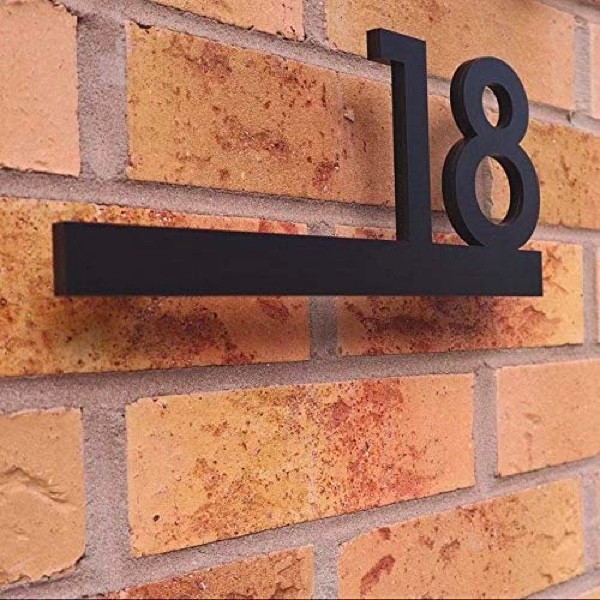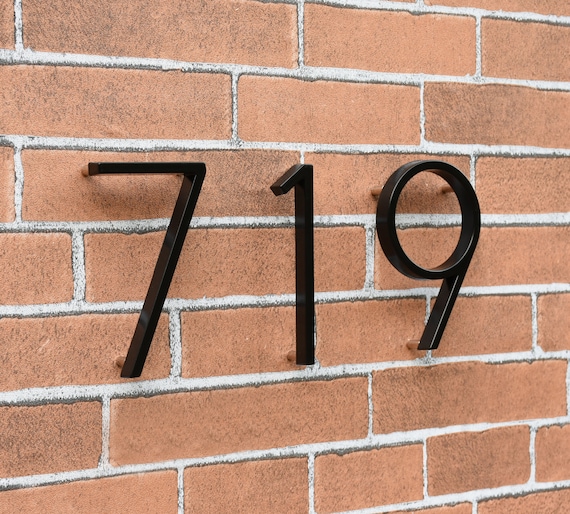
Introduction:
Welcome to “Elevating Your Home’s Exterior: The Beauty of Decorative Numbers for House” In this comprehensive guide, we will explore the significance, styles, materials, installation techniques, maintenance, and creative alternatives for decorative house numbers. These small yet impactful details have the power to transform the exterior of your home, adding a personalized touch and enhancing curb appeal. Join us as we delve into the world of decorative house numbers and discover the endless possibilities for making a statement.
Part 1: Recognizing the Significance of House Numbers
Level 1: Practicality and Functionality
Highlight the fundamental purpose of house numbers as a practical means for identifying homes. Discuss their significance in providing clear visibility for emergency services, deliveries, or guests. Emphasize the importance of maintaining legibility and contrasting colors to ensure easy identification.
Level 2: Expressing Personal Style
Explore how house numbers serve as an opportunity to express personal style and add a unique touch to the home’s exterior. Discuss their role as the first impression visitors have of your home and how they can showcase your taste, personality, or overall aesthetic. Highlight the ways in which decorative house numbers can enhance the overall aesthetic appeal of your property.
Part 2: Exploring Different Styles of Decorative House Numbers
Level 1: Traditional and Classic Designs
Discuss the timeless appeal of traditional house numbers, such as brass or cast iron styles. Explore the elegance of serif or script fonts and their ability to evoke a sense of history and heritage. Highlight their versatility and compatibility with a wide range of architectural styles.
Level 2: Contemporary and Modern Designs
Explore the sleek and sophisticated look of contemporary and modern house numbers. Discuss options like stainless steel, acrylic, or LED backlit numbers that offer a clean and minimalist aesthetic. Highlight their compatibility with modern architectural styles and their ability to add a touch of sophistication to any home.
Part 3: Materials and Installation Techniques
Level 1: Durable and Weather-Resistant Materials
Discuss the importance of selecting materials that can withstand the elements. Explore options such as stainless steel, aluminum, or bronze numbers that offer durability and longevity. Provide insights into the maintenance requirements of each material and their ability to resist fading, rusting, or deterioration over time.
Level 2: Installation Methods and Placement
Guide readers on various installation methods, including surface-mounted, flush-mounted, or floating options. Discuss the appropriate heights for visibility and readability. Provide tips on locating an optimal placement that complements the architectural features of the home. Highlight the importance of ensuring a secure installation to withstand outdoor conditions.
Part 4: Creative Alternatives for Decorative House Numbers
Level 1: Unique Materials and Finishes
Encourage readers to think beyond traditional materials and explore unique alternatives. Discuss options like reclaimed wood, ceramic tiles, or mosaic numbers that add a touch of artistry and craftsmanship. Explore finishes such as patina, hand-painted designs, or customized patterns that allow for a truly personalized touch.
Level 2: Customization and Personalization
Delve into the world of customization and personalization of decorative house numbers. Discuss the possibilities of working with local artisans, craftsmen, or specialized manufacturers to create unique designs that reflect individual style and preferences. Explore options for integrating personal elements, such as family initials or significant symbols, within the number design.

Part 5: Maintenance and Care for Decorative House Numbers
Level 1: Cleaning and Regular Maintenance
Guide homeowners on how to properly clean and maintain their decorative house numbers. Discuss using a mild soap and water solution, along with a soft cloth or sponge, to gently remove dirt, dust, or grime. Emphasize avoiding harsh chemical cleaners or abrasive tools that can damage the surface or finish of the numbers.
Level 2: Seasonal Maintenance
Highlight the importance of seasonal maintenance for long-lasting decorative house numbers. Discuss the need for reapplying protective coatings, such as clear sealants or weather-resistant finishes, to prevent fading, chipping, or other damage caused by changing weather conditions. Provide tips for inspecting the numbers for any signs of wear or damage that may require repair or replacement.
Part 6: Alternative Uses and Creative Placement of Decorative House Numbers
Level 1: Beyond the Front Door
Encourage readers to think outside the box and explore alternative uses for decorative house numbers beyond their traditional placement on the front door or mailbox. Discuss ideas such as incorporating numbers into garden art, creating mosaic stepping stones or address plaques, or even mounting large-scale numbers as a unique focal point on an exterior wall.
Level 2: Indoor Décor and Design
Inspire homeowners to bring the beauty of decorative house numbers indoors. Discuss creative ways to incorporate numbers into interior décor, such as using them as a unique wall art display, incorporating them into gallery walls, or repurposing old numbers as bookends or decorative objects on shelves. Highlight how these numbers can add a touch of personal style and whimsy to any room.
:max_bytes(150000):strip_icc()/house-street-number-on-the-wall-1153920634-7421a4bb5503439d8eb5d054e28d497b.jpg)
Part 7: Choosing the Right Decorative House Numbers for Your Home
Level 1: Consider Your Home’s Style and Architecture
Highlight the importance of choosing decorative house numbers that complement the style and architecture of your home. Discuss how traditional designs may work better for homes with classic or historic features, while contemporary or modern designs may better suit homes with sleek and minimalist designs.
Level 2: Think About Visibility and Readability
Encourage readers to consider the visibility and readability of the house numbers when choosing decorative options. Emphasize the need for numbers that are easy to read from the street and provide appropriate contrast against the background color. Discuss the importance of selecting the right size of the numbers for optimal visibility.
Level 3: Personal Preference and Style
Guide readers to follow their personal preferences and choose decorative house numbers that reflect their unique style or personality. Discuss how customized numbers or unique finishes may better suit those who want to stand out and make a statement. Emphasize the importance of choosing options that evoke a sense of pride and ownership for homeowners.
Conclusion:
“Elevating Your Home’s Exterior: The Beauty of Decorative House Numbers” has provided a comprehensive guide on the significance, styles, materials, installation techniques, maintenance, and creative alternatives for decorative house numbers. These small yet impactful details have the power to transform the exterior of your home, adding a personalized touch and enhancing curb appeal. Whether you opt for traditional or contemporary designs, durable materials or unique finishes, decorative house numbers offer endless possibilities for customization and personalization. Embrace the creativity and charm of decorative house numbers and let them become a visual representation of your home’s identity.
The Beauty of Decorative House Numbers has provided a comprehensive guide on the significance, styles, materials, installation techniques, maintenance, and creative alternatives for decorative house numbers. These small yet impactful details have the power to transform the exterior of your home, adding a personalized touch and enhancing curb appeal. From regular cleaning and maintenance to exploring alternative uses indoors, decorative house numbers offer endless opportunities for customization and personalization. Embrace the creativity and charm of decorative house numbers, and let them become a visual representation of your home’s identity, both inside and out.

